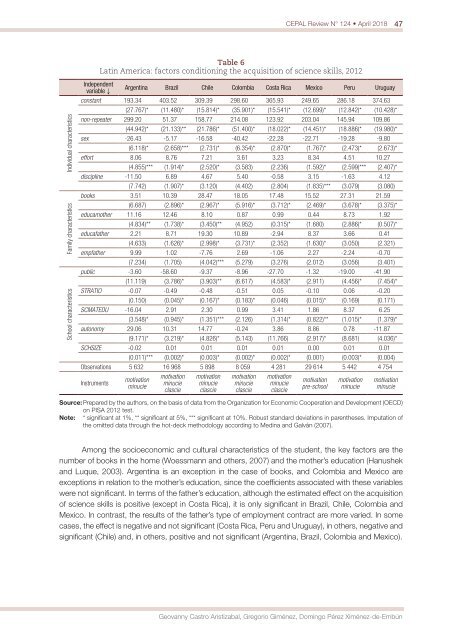CEPAL Review no. 124
April 2018
April 2018
You also want an ePaper? Increase the reach of your titles
YUMPU automatically turns print PDFs into web optimized ePapers that Google loves.
<strong>CEPAL</strong> <strong>Review</strong> N° <strong>124</strong> • April 2018<br />
47<br />
Individual characteristics<br />
Family characteristics<br />
School characteristics<br />
Table 6<br />
Latin America: factors conditioning the acquisition of science skills, 2012<br />
Independent<br />
variable ↓<br />
Argentina Brazil Chile Colombia Costa Rica Mexico Peru Uruguay<br />
constant 193.34 403.52 309.39 298.60 365.93 249.65 286.18 374.63<br />
(27.767)* (11.480)* (15.814)* (35.901)* (15.541)* (12.699)* (12.842)* (10.428)*<br />
<strong>no</strong>n-repeater 299.20 51.37 158.77 214.08 123.92 203.04 145.94 109.86<br />
(44.942)* (21.133)** (21.786)* (51.400)* (18.022)* (14.451)* (18.886)* (19.980)*<br />
sex -26.43 -5.17 -16.58 -40.42 -22.28 -22.71 -19.28 -9.80<br />
(6.118)* (2.658)*** (2.731)* (6.354)* (2.870)* (1.767)* (2.473)* (2.673)*<br />
effort 8.06 8.76 7.21 3.61 3.23 8.34 4.51 10.27<br />
(4.855)*** (1.914)* (2.520)* (3.583) (2.236) (1.592)* (2.599)*** (2.407)*<br />
discipline -11.50 6.89 4.67 5.40 -0.58 3.15 -1.63 4.12<br />
(7.742) (1.907)* (3.120) (4.402) (2.804) (1.835)*** (3.079) (3.080)<br />
books 3.51 10.39 28.47 18.05 17.48 15.52 27.31 21.59<br />
(6.687) (2.896)* (2.967)* (5.916)* (3.712)* (2.469)* (3.678)* (3.375)*<br />
educamother 11.16 12.46 8.10 0.87 0.99 0.44 8.73 1.92<br />
(4.834)** (1.738)* (3.450)** (4.952) (0.315)* (1.680) (2.886)* (0.507)*<br />
educafather 2.21 8.71 19.30 10.89 -2.94 8.37 3.66 0.41<br />
(4.633) (1.626)* (2.998)* (3.731)* (2.352) (1.630)* (3.050) (2.321)<br />
empfather 9.99 1.02 -7.76 2.69 -1.06 2.27 -2.24 -0.70<br />
(7.234) (1.705) (4.042)*** (5.279) (3.276) (2.012) (3.056) (3.401)<br />
public -3.60 -58.60 -9.37 -8.96 -27.70 -1.32 -19.00 -41.90<br />
(11.119) (3.786)* (3.903)** (6.617) (4.583)* (2.911) (4.456)* (7.454)*<br />
STRATIO -0.07 -0.49 -0.48 -0.51 0.05 -0.10 0.06 -0.20<br />
(0.150) (0.045)* (0.167)* (0.183)* (0.046) (0.015)* (0.169) (0.171)<br />
SCMATEDU -16.04 2.91 2.30 0.99 3.41 1.86 8.37 6.25<br />
(3.548)* (0.945)* (1.351)*** (2.126) (1.314)* (0.822)** (1.015)* (1.379)*<br />
auto<strong>no</strong>my 29.06 10.31 14.77 -0.24 3.86 8.86 0.78 -11.87<br />
(9.171)* (3.219)* (4.826)* (5.143) (11.766) (2.917)* (8.681) (4.036)*<br />
SCHSIZE -0.02 0.01 0.01 0.01 0.01 0.00 0.01 0.01<br />
(0.011)*** (0.002)* (0.003)* (0.002)* (0.002)* (0.001) (0.003)* (0.004)<br />
Observations 5 632 16 968 5 898 8 059 4 281 29 614 5 442 4 754<br />
Instruments<br />
motivation<br />
minucie<br />
motivation<br />
minucie<br />
clascie<br />
motivation<br />
minucie<br />
clascie<br />
motivation<br />
minucie<br />
clascie<br />
motivation<br />
minucie<br />
clascie<br />
motivation<br />
pre-school<br />
motivation<br />
minucie<br />
motivation<br />
minucie<br />
Source: Prepared by the authors, on the basis of data from the Organization for Eco<strong>no</strong>mic Cooperation and Development (OECD)<br />
on PISA 2012 test.<br />
Note: * significant at 1%, ** significant at 5%, *** significant at 10%. Robust standard deviations in parentheses. Imputation of<br />
the omitted data through the hot-deck methodology according to Medina and Galván (2007).<br />
Among the socioeco<strong>no</strong>mic and cultural characteristics of the student, the key factors are the<br />
number of books in the home (Woessmann and others, 2007) and the mother’s education (Hanushek<br />
and Luque, 2003). Argentina is an exception in the case of books, and Colombia and Mexico are<br />
exceptions in relation to the mother’s education, since the coefficients associated with these variables<br />
were <strong>no</strong>t significant. In terms of the father’s education, although the estimated effect on the acquisition<br />
of science skills is positive (except in Costa Rica), it is only significant in Brazil, Chile, Colombia and<br />
Mexico. In contrast, the results of the father’s type of employment contract are more varied. In some<br />
cases, the effect is negative and <strong>no</strong>t significant (Costa Rica, Peru and Uruguay), in others, negative and<br />
significant (Chile) and, in others, positive and <strong>no</strong>t significant (Argentina, Brazil, Colombia and Mexico).<br />
Geovanny Castro Aristizabal, Gregorio Giménez, Domingo Pérez Ximénez-de-Embún


















